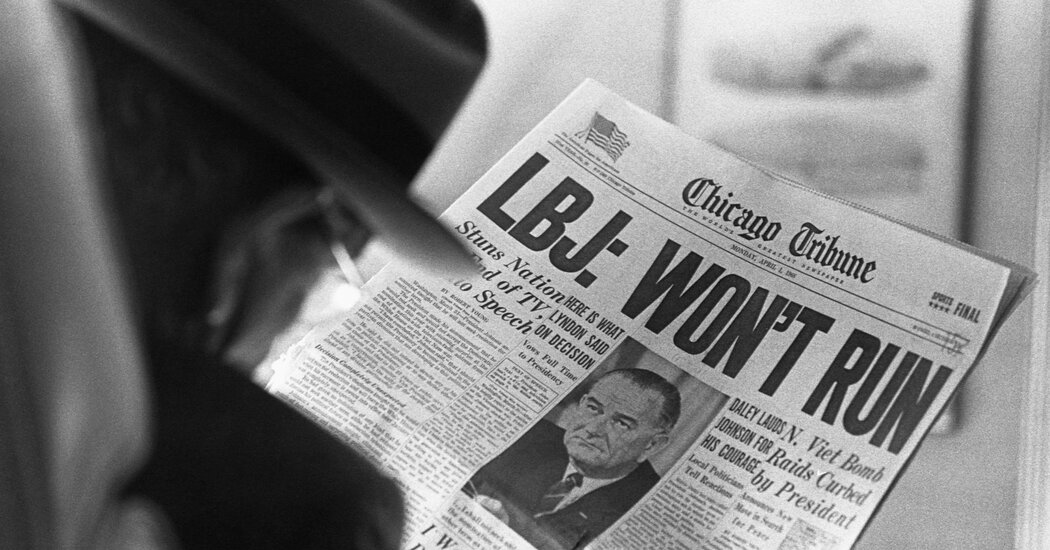On March 31, 1968, Lyndon Johnson used a nationally televised address from the Oval Office to announce that he would no longer seek, and would not accept, his party’s nomination for the presidency of the United States.
After his catastrophic performance at last week’s debate, President Biden is under growing pressure to do the same. It’s tempting to think of the comparison as pure political tragedy: two proud men coming to the end of their often-distinguished careers, forced to face that they were deeply wounded candidates heading toward humiliating defeats they could avoid only by surrendering the second terms they were sure they deserved.
To see the moment only in those terms, though, misses the importance of what Johnson did in 1968. Yes, his candidacy had been severely damaged. His decision to drop out of the campaign was tangled up in all sorts of political, psychological and emotional issues. What is forgotten about Johnson’s decision is the number of other factors the president was weighing.
More than anything else, he was hoping that by ending his campaign he could defuse an existential threat to the nation. The details may be different, but that’s the situation Mr. Biden is facing, too.
Johnson’s crisis started on Jan. 30, 1968, when the North Vietnamese military broke the Vietnam War’s annual New Year cease-fire with a surprise assault on almost every strategic site in South Vietnam. Analysts would later say that the United States’ counterattack turned the Tet offensive into a rout. But that wasn’t clear at the time. It took 12 days for American and South Vietnamese troops to drive the North Vietnamese out of Saigon’s Cholon district and over a month for them to reclaim the coastal city of Hue, at a casualty rate higher than the Americans had suffered at any previous point in the war.
Then the crisis deepened. On Feb. 27, 1968, the Joint Chiefs of Staff formally requested that Johnson increase the troop deployment in Vietnam to 700,000 soldiers, a 40 percent increase over the half-million already there. For almost two weeks, Johnson’s advisers fiercely debated a potential escalation. On the 13th day — March 10 — news of the request leaked and led to a firestorm of criticism from the Democratic Party’s antiwar wing. Two days later, the wing’s only presidential candidate, Senator Eugene McCarthy of Minnesota, took 42 percent of the vote in the New Hampshire primary, surprisingly only eight points behind Johnson.
The next morning, Robert Kennedy told reporters he might enter the race, too. And that afternoon, the global economy started to collapse.
For 24 years the United States had anchored much of the world’s trade by pegging foreign currencies to the dollar and then guaranteeing investors that they could trade each dollar they held for gold at a set rate of exchange. The escalating cost of the Vietnam War had shaken investors’ faith in that promise. March’s turmoil shattered it. So they unleashed a gold run.
On March 13, 1968, they drained $200 million from the government’s gold reserves. The next day they doubled that amount, and the day after that the losses crept toward a billion dollars, a sum so staggering, economists warned that Washington would soon have to devalue the dollar, a move that was likely to cause a global depression.
The administration understood that the panic was likely to set in again unless fundamental changes were made. “We are at a most important moment in postwar history,” Johnson’s national security adviser wrote him on March 19. Johnson could no longer weigh political calculation against this existential crisis. Twelve days later, he withdrew from the race.
His announcement was so shocking, it overshadowed the parts of the speech that preceded it. He said that he was giving the Joint Chiefs only a small fraction of the troops they wanted, and after that there’d be no more. He told investors that he’d stabilize the budget Vietnam had ravaged by raising taxes and cutting domestic spending, though the latter was a crushing concession. And he told the North Vietnamese that he’d enter peace talks wherever and whenever they wanted, “to discuss the means of bringing this ugly war to an end.”
Only then did Johnson say that he wasn’t running, a placement meant to assure the listeners he needed to reach — the generals, the investors, the North Vietnamese — that the actions he was taking weren’t political. They were foundational, their promise secured by his willingness to sacrifice his presidency for the good of the nation.
Now Mr. Biden is facing a threat that may pose an even greater danger to the nation. It was on stark display at Thursday’s debate, not in the rare moments when Donald Trump mentioned specific policies he’d pursue in his second term, as disturbing as many of his proposals are, but most alarmingly in Mr. Trump’s repeated refusal to say that he’d accept the election results, his explicit threat to prosecute Mr. Biden on charges he didn’t bother to specify and his utter debasement of the political process through his relentless deployment of xenophobia and racial hatred, his fear mongering and his cascade of lies.
Mr. Biden is right to say, as he has throughout the campaign, that this year democracy is under threat. The crucial question is whether his being on the ballot is the best way to protect it.
He seems to think it is. That’s understandable. His withdrawing from the race would create enormous challenges for a political system that is no longer set up structurally or practically to have a party’s presidential nominee chosen in an open convention. On the face of it, the Democrats’ experience in 1968 isn’t reassuring. While Johnson’s withdrawal did calm the markets and lead to peace talks, it added to the chaos that was already taking hold of the nominating process and would all but consume it once the party staggered into its convention.
But there isn’t any reason to think that the same thing would happen in 2024. The Democrats certainly had their differences in the last three election cycles. Yet the party is far more unified now than it was in 1968, and each time it managed to create a cohesive front against the threat that Mr. Trump posed — most notably in 2020, when it closed around Mr. Biden’s candidacy, despite his stumbles in the primary season.
In the end, the greatest roadblock to Mr. Biden’s withdrawal is likely to be personal rather than political. He has long defined himself by his ability to overcome seemingly unbearable blows. He did it again as he closed a Friday afternoon speech in North Carolina with a rousing recitation of a line he’s used throughout his career: “I know what millions of Americans know,” he said. “When you get knocked down, you get back up!” To withdraw from the race now would be to admit that, in his aging, he’s met a challenge he can’t overcome.
What Mr. Biden shouldn’t do is see that concession as a sign of weakness or defeat but rather as an opportunity to do as Johnson had done in another intensely dangerous time: to go before the American people to say that he will not accept his party’s nomination and, with that admittedly wrenching and profoundly courageous act, stand in defense of the nation he has sworn to protect and preserve.
Kevin Boyle, a history professor at Northwestern University, is the author, most recently, of “The Shattering: America in the 1960s.





